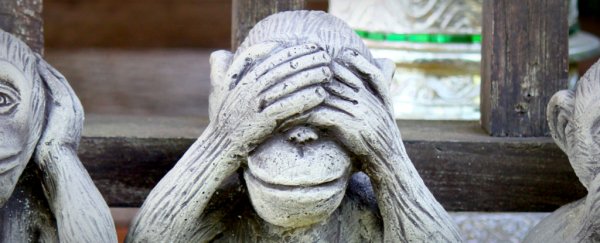We all like to think that we're rational creatures able to make objective decisions, but our biases may be a lot stronger than we think.
New research has found that humans have an excellent ability to ignore facts that don't fit with our own biases, not just on Facebook where the stakes are pretty low, but even when it can cost us money.
Stefano Palminteri of École Normale Supérieure led a team of researchers from ENS and University College London, which previously reported that humans are biased towards the path of least resistance, even though that can make us depressed later on.
In those situations, people don't seem to be able to perceive intangible future repercussions.
Palminteri's team sought to discover in an experimental environment whether our biases are so strong that we continue to hold onto them even when something tangible is on the line in that moment.
The study involved 20 volunteers performing two variants of a task: choosing between pairs of symbols, each of which had been assigned a points value.
For the first variant of the task, the participants were only told the value of the symbols they chose. Over time, they learned that some symbols were more valuable and developed a bias towards choosing those symbols.
For the second variant, the participants were told the values of both symbols, even though they could only pick one. However, they continued to choose the symbols they had learned to be biased towards in the first part of the experiment, even when they had proof that the other symbol was worth more.
This could be why some people won't change their minds, even when the evidence is staring them in the face.
"It's as if you don't hear the voices in your head telling you that you're wrong, even if you lose money," Paliminteri told New Scientist.
There's still hope that if you work hard at it, you can try and reduce the effect of your biases. A 2012 study into implicit bias found that being aware of your bias and caring about its effects are powerful tools in the fight against it.
Working hard is key here, though. In 2015, Carnegie Mellon researchers published findings that almost everyone is blind to their own biases, and this is not easy to overcome.
"Complete objectivity is probably something we will never fully achieve," Palminteri siad.
The research has been published in the journal PLOS Computational Biology.
